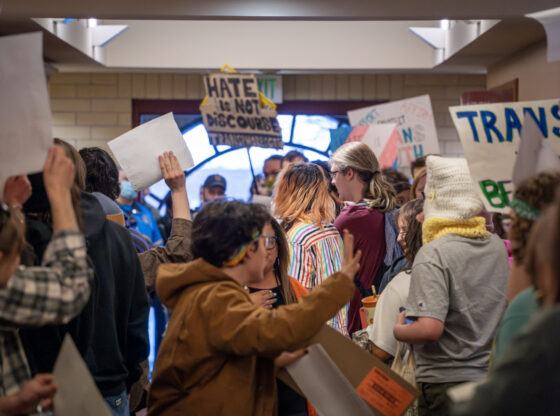This article is part five of a seven-part series that focuses on how sustainability impacts students on a college campus. This series will go in-depth on topics that intersect with sustainability, such as energy use, food waste, environmental racism, recycling, compost and more.
The war on fossil fuels has been ongoing and persistent. Across the nation, student environmental activist groups continue to pressure university administration and the Board of Trustees to divest from fossil fuel companies.
It should be noted that there are intersections between DU’s connection with Xcel Energy and the Board of Trustees’ refusal to divest. DU’s partnership with Xcel has propelled the campus towards more sustainable practices, and that is why the Board has chosen to not divest.
Fossil Fuel Divestment
The controversy around DU’s continuous contributions to fossil fuel companies has been a hot topic within the student body for years. In the past four years, there have been climate justice rallies, Chancellor Jeremy Haefner refusing USG’s proposal asking the university to divest, meetings with administration and passionate writers voicing their opinion through the Clarion. Despite this movement, though, the Board of Trustees has said no to divestment and the Denver Post called it “unrealistic” and “unwise” for DU to divest.
“Divestment is an incredible tool for students to use. This is a rare opportunity to move mass sums of money from extractive corporations to regenerative, community-controlled economies,” Gracie Brett—a member of Better Future Project Divest Ed, a national training and strategy hub for divestment across the nation—said.
Divestment is the process of selling assets, investments or divisions of a company. Fossil fuel divestment is the act of investing in climate solutions and selling stakes in non-renewable energy sources. Divestment places social, political and economic pressure on fossil fuel companies because it limits their overall financial gain as partners stop contributing to their companies.
There is also an intersectionality component of divestment. The fossil fuel industry has greatly impacted Native communities. Nationally, Indigenous peoples have protested against the energy exploitation on Native lands. These notable fights over fossil fuels and land have taken place at Standing Rock, Keystone XL pipeline, the Dakota Access pipeline and more.
Native American reservations represent 2% of America’s land, but hold 20% of the country’s fossil fuel coal, oil and gas reserves.
The Native community has continuously been on the frontlines of protests about divestment. When DU chooses to not divest, they risk hurting their already-fragile relationship with the Native community. At DU, student activists from the Native Student Alliance (NSA) organized a 2016 protest of the Dakota Access Pipeline outside of the Pipeline Leadership Conference at Daniels College of Business. Divest DU also notably stood in solidarity with NSA to support the defense of their communities and those protesting Standing Rock.
Divest DU
Many students may be familiar with Divest DU, a student activist organization that pressures the Board of Trustees to divest DU’s endowment from the fossil fuel industry. The activist group has hosted rallies and campaigns and taken actions such as encouraging students to sign an online petition addressed to Chancellor Haefner and the Board of Trustees.
“DU students are passionate about the environment because so much of what we love to do is dependent on it,” said a Divest DU spokesperson. “Skiing, hiking, climbing or anything of the sort is reliant on having an environment that can sustain it. When sustainability comes to mind, many people do not make the jump to divestment. But it is an important part of sustainability—particularly, in a world where money talks.”
The largest barrier the university faces to divestment is that they do not manage their endowment and DU is tuition-dependent. Endowments are financial assets that are donated by donors and alumni to the university. They fund teachers, research and the overall mission of each college. Every university has a team that manages the money. At DU, this is the Board of Trustees, an investment committee and Investure, LLC (a leader of the investment management industry).
Harvard and Yale were able to divest at a faster rate because they manage their own endowment and could quickly allocate their money elsewhere. This is more difficult for smaller schools that have limited freedom to move financial capital.
Frank Laird, associate professor of Josef Korbel School of International Studies, believes that the university is “stuck” with divestment and it is better to “invest in more sustainable companies that would benefit the university in the long run.”
The many schools that have already or are in the process of divestment include UCLA, University of Washington, Stanford, Syracuse, Georgetown, University of Dayton, Harvard, Brown, Middlebury and Oxford.
Taking Action
Although it may be difficult for DU to divest, it is not impossible. The other universities that have divested are examples that DU could follow. Divestment groups around the nation are continuously putting pressure on institutions and holding leaders responsible for their actions.
“We have actively worked on petitioning the student body to get the topic of divestment brought up in a Board of Trustees meeting,” said a Divest DU spokesperson. “Through the initial push for divestment back in 2016, the university decided to provide more funding for sustainable endeavors. [This included] the Green Fund, which provides money for acts of sustainability around campus, and the 25×25 campaign that put all the solar panels around campus.”
The Board of Trustees has performed multiple reviews on the potential for divestment at DU. They have continuously come to the conclusion not to divest.
Haefner elaborated in an email on what divestment means for DU, saying, “Divesting from fossil fuels would have less of an impact on increasing sustainability than what we are able to achieve through research and learning—research and learning funded, in part, through our endowment.”
“Currently less than 3% of our endowment is invested in companies associated with fossil fuels. In contrast, nearly 8% is invested in companies associated with sustainability, such as renewable energy, LEED-certified real estate and other sustainable products.”
Students can enact change by taking steps such as, “calling and emailing your Board of Trustees, making petitions, starting up protests or whole campaigns or doing grassroots work,” said Andrea Wetzler, an advocate for Divest BU, an environmental activist group of Boston University students.
“Students make change when they realize the power that they have as a collective and then organize behind a common set of goals,” said the Divest DU spokesperson. “Without the students and their allies in faculty and staff departments, the university is a skeleton of nice buildings, manicured lawns and empty classrooms.”
Today, in this virtual environment, Divest DU has chosen to spend their time uplifting and advocating other forms of activism such as the No More Pios movement.
“Environmental justice is an intersectional fight, and we must all recognize that [and] work to rally behind all pressing issues on campus,” a Divest DU spokesperson said.
“I believe that issues of sustainability are intrinsically linked to issues of equity. Climate change is already disproportionately affecting marginalized populations. As these populations tend to have fewer resources, they do not have the ability to move or make other changes to combat climate change’s impact on their lives. As individuals, as an institution, and as a society working to advance sustainability and combat climate change, we are also working to protect marginalized populations,” Haefner said.
Xcel Energy
Divestment has been put on the back burner, in part due to COVID-19. During this time, DU is looking to cut costs and not to increase them.
“It is a constant process of balancing how we can continue to increase access to a DU education to students from all backgrounds with larger societal issues, such as sustainability,” said Haefner. “And, importantly—especially now as COVID-19 creates harsh financial realities for many families—we do not want to jeopardize urgent priorities such as student financial aid.”
Xcel Energy has made strides towards reducing its commitment to fossil fuel companies. So far, Xcel has divested from Mankato Energy Center, a natural gas-fired power plant, and made the switch to a Denver-based independent power producer called Southwest Generation. Xcel’s goal is to move to completely coal-free resources, as it has begun closing coal plants around Minnesota.
Laird said, “It is good that solar insulation [for the new LEED buildings] got finalized before COVID-19 because DU is trying to keep their costs down. They are not looking to spend more money on anything.”
Xcel Energy hopes to achieve 100% carbon-free electricity with all of its customers. Xcel partnered with climate scientists at DU to ensure the university can meet the temperature goals of the Paris climate agreement.
“Environmental activist groups were initially hostile to Xcel,” Laird said.
The hostility stemmed from Xcel being a large corporation that benefits from capitalism. Environmental groups were unsure if Xcel had moral intentions with their sustainable practices. Additionally, activists disagree with how Xcel charges a flat rate for every consumer regardless if they conserve energy or never turn their lights off.
One of Xcel’s initiatives toward sustainability is a program called Windsource, which increases the number of renewable resources for customers. These consumers can pay a surcharge on their bill, and it will go towards the installation of wind farms around the nation. This is one of the many efforts Xcel is taking towards being more environmentally-conscious.
Laird was on the frontlines of marketing Xcel’s wind source because he wanted environmentalists to see this was a step in the right direction. It took 20 years for Xcel to switch from traditional fossil fuels to using renewables.
It is important to acknowledge that DU’s electric bill is not cheap. These finances are the biggest hindrance getting DU to divest; it is expensive to take even a small step towards renewable energy.
This is why DU is currently undergoing the Denver Advantages Project. It may seem counterintuitive to design large buildings that could increase DU’s overall carbon footprint, but it is more sustainable in the long-run as the buildings use up less energy and resources. The bigger the facility, the cheaper the kilowatts are per hour.
Although DU’s lack of divestment is disappointing to many students, there have been small wins and moves towards sustainability at this university.
Professor Laird says, “I think [the world of sustainability] is moving fast. There have been faster and better developments within sustainability. If you push out the noise from political systems, you begin to see developments and change.”
In the end, DU faces the same challenges that any institution that has not divested experiences. Some of these problems may seem intangible, as the real challenge lies with Xcel Energy.
The connection between DU’s relationship with Xcel Energy and divestment is complicated and stagnant. The Board of Trustees at DU have continuously turned down students’ requests for the university to divest from the fossil fuel industry. This has caused a strain between environmental groups and the administration, but the battle to divest will not stop. Students will continue to voice their opinions and stand up against large institutions and corporations.











